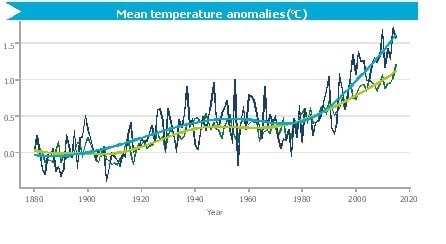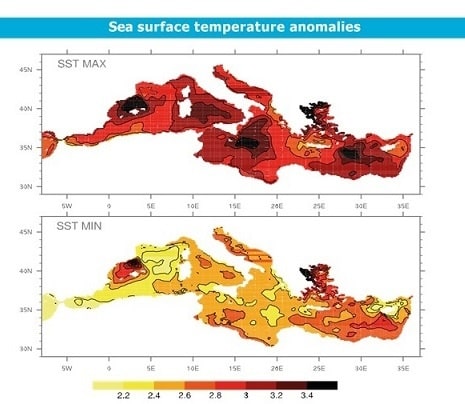Rising inequality, growing impact of climate change, biodiversity loss, unrelenting pressure on natural resources could lead to irreversible environmental damage in the Mediterranean basin, according to a new report by the UN Environment Programme (UNEP).
Launched on the 21st of October on the sidelines of the EU Green Week, the State of the Environment and Development in the Mediterranean finds that the future of the Mediterranean is on the line. Unless urgent and resolute action is taken to halt current trends, environmental degradation could have serious and lasting consequences for human health and livelihoods in the region.
“The time for resolute action to save the Mediterranean is now and tapping into knowledge of the interactions between environment and development will be crucial,” underlined Gaetano Leone, the Coordinator of UNEP/MAP-Barcelona Convention Secretariat during the online media briefing organized by UNEP and the European Commission.
The conclusions of this report which has been produced by UNEP/MAP Regional Activity Centre Plan Bleu, a regional activity centre of the UNEP Mediterranean Action Plan (MAP), on the state of the Mediterranean are alarming:
- At least 228.000 deaths are linked to air pollution each year, 15 per cent of deaths in the Mediterranean are attributable to preventable environmental factors
- Every day 730 tones of plastic waste end up in the Mediterranean.
- The basin is under pressure: 1 third of the population is concentrated on the coast. The world’s most visited tourist destination, the Mediterranean saw the number of tourists multiply by 6 over the last 50 years.
- The decline of Posidonia Oceanica (an endemic seagrass species known as the “lungs of the Mediterranean”), the presence of more than 1,000 non-indigenous species are among the symptoms of environmental degradation.
- Marine and coastal ecosystems are reeling under pressure from the unsustainable pursuit of economic growth. This pressure is illustrated by the challenges of marine litter, and pollution, and further compounded by the rising impacts of climate change.
Climate change in the Mediterranean basin
In particular for climate change, the report highlights that the Mediterranean region is warming 20 per cent faster than the global average. Climate change is expected to have significant impacts on the terrestrial, coastal and marine environment of the Mediterranean region. These include an expected increase in aridity, due to reduced precipitation and warming; an increased risk of more frequent and severe fires with projected increases of the burned area between 40 and 100%; and, negative impacts on the wildlife of inland wetlands and freshwater ecosystems due to falling water levels and reduced water quality. The expected decrease in ecosystem integrity, biodiversity, and carbon storage capacity will lead to soil erosion, soil fertility loss, and desertification. Overall crop productivity is expected to fall by over 20% in 2080 in Mediterranean countries, with peaks of an almost 40% decrease in Algeria and Morocco, threatening the already challenging food security of a population that is expected to grow.

Figure 1
Historic warming of the atmosphere, globally and in the Mediterranean Basin. Annual mean air temperature anomalies are shown with respect to the period 1880-1899, with the Mediterranean Basin (blue) and the planet (green) presented with and without smoothing. (Source: Data from Berkeley Earth cited in Cramer et al, 20184)
Figure 2
Sea surface temperature anomalies (maximum (top) and minimum (bottom)) for the 2070–2099 period (vs. 1961– 1990), in °C. (Source: Adloff et al., 2015 5)
The particularly high density of the coastal population and infrastructure on the shoreline, linked to a limited tidal range, make the Mediterranean coast particularly vulnerable to changes in climate and sea level. Extreme rainfall and droughts, combined with sea level rise, will contribute to higher risks of coastal flooding and erosion, with increasing damage to key infrastructure and highly-populated and growing cities, which are primarily located in the coastal area. In particular, the effects of sea level rise are expected to be high for most low-lying coasts of the Mediterranean basin.
Sea warming and ocean acidification are expected to have negative impacts on marine biodiversity and dependent human activities, while wave and storm surge activity will likely decrease in a warmer future.
Mediterranean countries are designing national frameworks to mitigate and adapt to climate change. These efforts need to be urgently implemented, effectively enforced and their ambition strengthened in a multistakeholder context, the report highlights.
The SDGs in the Mediterranean countries
“By shedding light on the mistakes of the past, the report’s findings can guide a green renaissance in the Mediterranean. Embarking on greener development paths now can halt the environmental degradation trends and salvage hard-won achievements in the implementation of the Sustainable Development Goals (SDGs),” said Gaetano Leone, Coordinator of the UNEP/MAP-Barcelona Convention Secretariat, during the online presentation of the report.
With GDP on the European shore on average three times higher than in south and east Mediterranean countries, the report indicates that the region, which is home to more than 512 million people, is not on track to achieve the SDGs by 2030.
In particular, the majority of observed trends show developments that are either progressing towards the set targets, but at an insufficient rate or unequally across the countries, or moving away from the target. Nine out of the 21 Mediterranean countries had achieved none of the SDG 2030 targets in 2019 and the maximum number of SDGs achieved by a country is two (out of 17). Eleven SDGs remain unachieved in all Mediterranean countries, including SDG 13 “climate action”, SDG 14 “life below water” and SDG 15 “life on land”. Concerning SDG 2 “zero hunger”, SDG 5 “gender equality”, SDG 11 “sustainable cities and communities” and SDG 14 “life below water”, none of the Mediterranean countries show a trend that is in line with achievement of the objectives by 2030.
Αs the report underlines, major changes in production and consumption patterns are urgently needed to progress decisively towards inclusive sustainable development, with a focus on climate change concerns, biodiversity protection and ecosystem restoration, pollution prevention and the circular economy. Transition towards the blue/green economy is a key challenge in the region that requires the funding of polluting activities to be reoriented towards sustainable activities.
Five levers of action needed
“The future of the Mediterranean is on the line. In the past few months, the world has been wondering what the world will be like in the future,” said Francois Guerquin, Director of Plan Bleu. “This is the third issue of the SoED report since 2005 and very little has changed since. If we want to protect the Mediterranean for present and future generations, we can no longer afford piecemeal steps. We must embark on drastic changes in our relationship with nature.”
In order to induce transformative change that tackles the drivers of environmental degradation, the report identifies five levers of action:
-
Incentives and capacity building: phasing out environmentally harmful subsidies and incentivizing sustainable options – including removing subsidies on non-renewable energies and groundwater extraction – while empowering local administrations and actors to implement nationally or internationally agreed commitments and measures.
-
Intersectoral cooperation: ensuring that shifting development pathways are shared by all sectors, not just administrations in charge of the Environment, and prioritising sustainability in all sectoral policies.
-
Preventive action: implementing measures that prevent degradation, which are generally less costly and lead to better environmental and social outcomes than clean-up and curative action.
-
Resilience-building under uncertainty: directing action and investment towards adaptation to projected environmental stresses, including by harnessing nature-based solutions.
-
Enforcement of legal obligations: promoting the adoption of provisions in national legislation to allow for accountability and legal action, and strengthening the legal and administrative mechanisms involved in enforcement including those undertaken by the Mediterranean countries under the Barcelona Convention and its Protocols.
The report’s authors stress the urgent need for appropriate and effective policy responses to alleviate pressure on the environment while meeting pressing human development needs.
As they emphasize at the conclusion of the “Key messages” chapter, the overarching objective of the Barcelona Convention – “the preservation and sustainable development of a common heritage, in the interest of present and future generations” cannot be reached by pursuing current trajectories and requires transformative change. Systemic behaviour modification calls for an inclusive approach with the active participation of all stakeholders in the different steps of the policy cycle. Urgent action is needed to integrate the environmental, economic and social spheres on realistic yet desirable transition pathways.
Sources:




